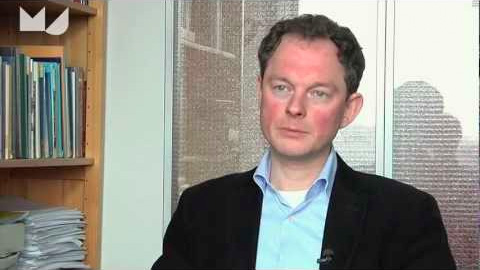‘Screwed’ by the bank
Bezemer made that remark in response to the debate held on Wednesday, 16 March in the Lower House. The subject concerns us all: the monetary system.
It was placed on the agenda by the Our Money Foundation (Stichting Ons Geld). With the support of the theatre group ‘De Verleiders’ (see box), they gathered more than the required number of signatures, thus ensuring that the Lower House will discuss it.
De Verleiders
Theatre group De Verleiders (The Seducers in English) perform pieces about the power of the banks and our monetary system. De Verleiders are Pierre Bokma, George van Houts, Victor Löw, Leopold Witte and Tom de Ket. The play ‘Screwed by the bank’ will be performed in theatres through July 2016.
Generating money
According to Stichting Ons Geld, financial power lies in the hands of the bankers. And those banks generate money which was not there in the first place. If a customer wants a mortgage, they go to the bank. The bank looks at their income and credit rating, and then decides to give said customer a loan. The bank notes the loan amount in its books as a debt. The customer pays off the loan, which means that more money enters the economy. The foundation feels that the job of ‘creating money’ should be up to the government rather than the banks. They are also of the opinion that it is not possible to endlessly create money, as doing so destroys the economy.
RUG economist Dirk Bezemer does not have a problem with the creating of money, but he does feel that the banks have too much power. ‘There is nothing wrong with banks being the ones lending money, but they should be more closely monitored’, he says. ‘More control is absolutely necessary.’ In the past, the banks were more concerned with their own interests than the Dutch economy, according to Bezemer.
Imbalances
He would like to see it done differently: ‘70 per cent of all money is allocated to loans and mortgages; money that, for the most part, does not benefit the economy. As a result, the total debt could become so great that another crisis could be around the corner. The other 30 per cent is allocated to businesses with a good, innovative business plan. That is useful for the economy’, says Bezemer. According to him, the ratios are completely wrong: banks are allowed to make a profit, but this should not come at the expense of the economy.
Skeptical
‘Banks have too much power’
Bezemer is happy that this issue is finally being discussed, but he is also skeptical: ‘It is a complicated matter, even for the financial specialists in the Lower House. Moreover, the banks have been considered to be the driving force of the economy since the cabinets of Kok and Balkenende. The power of the banks is great, and politics is closely linked to the banks.’ Bezemer would like to see research being done into what debt does to the economy. ‘Once that is known, then policies can be more easily put into place and legislation can be passed.’
The economist is not extremely hopeful about the conclusion of the Lower House: ‘Our monetary system is firmly set in a financial framework that it is difficult to change it. I fear that the debate won’t yield anything.’
If the government does nothing and the action taken proves to be fruitless, it’s only a matter of time before a new crisis will occur, according to Luuk de Waal, president of Stichting Ons Geld. De Waal: ‘If they do not share our view now, they certainly will when the next truly massive crisis comes around. Either way, we are hopeful, but not naïve.’

RUG economist Dirk Bezemer






